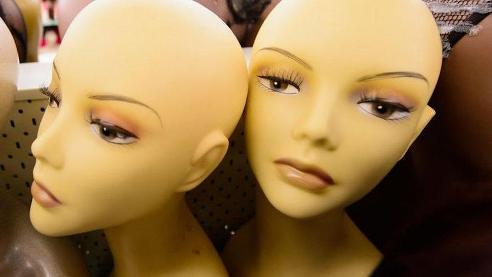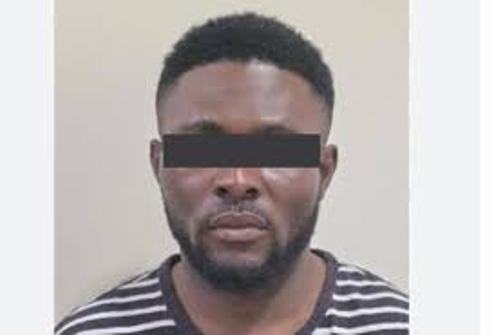
LAGOS AUGUST 16TH (NEWSRANGERS)-The Islamic police force in Kano, a Muslim-majority state in Nigeria, has raised eyebrows after it ordered shops to only use headless mannequins to advertise clothing.
“Islam frowns on idolatry,” Haruna Ibn-Sina, the commander of the Sharia police known as the hisbah, told the BBC.
“With the head on it looks like a human being,” he added.
Mr Ibn-Sina also wants the headless mannequins covered at all times because to show “the shape of the breast, the shape of the bottom, is contrary to the teachings of Sharia [Islamic law]”.
Kano is one of 12 states in the Muslim-majority north that practise Islamic law. The legal system is supposed to apply only to Muslims.
But in reality, non-Muslims come under pressure to adhere to the hisbah’s rulings, including the ban on full-bodied mannequins.
“We have received lots of calls and messages from those who say they disagree with the order,” said Moses Ajebo, a radio talk-show host in Kano city, the second-biggest in Nigeria.
Traders at Sabon Gari, a Christian-dominated part of Kano state, also expressed their displeasure with the hisbah’s order.
Shop owner Chinedu Anya said that displaying clothes on a headless mannequin would reduce their attractiveness to passers-by and affect his business.
Mohawk hairstyle shaved
Mr Ibn-Sina and his officers – who number in the thousands, and are made up of both men and women – have not yet gone shop-to-shop to enforce the ban.
Nevertheless, there are concerns that it adds to the list of the hisbah’s pronouncements that clash with secularism and modernity.
Last week Mr Ibn-Sina criticised photos from the bridal shower of Zahrah Bayero, the fiancée of President Muhammadu Buhari’s son, Yusuf.
He said she failed to set a good example to other Muslims as the photos showed her exposed shoulders.
He also criticised those who shared the images, saying that it was a sin to do so.
Last year, Mr Ibn-Sina’s officers shaved off the Mohawk hairstyles of young men on the pavements of Kano city, and he also chastised others for wearing low-hung trousers.
Mr Ibn-Sina also barred the use of the term Black Friday to advertise sales, saying that Friday was a holy day in Islam.
He was largely ignored by radio stations and shopping malls and they faced no sanctions.
Residents also received a warning against performing a dance from South Africa – where participants theatrically fell to the ground – that went viral on social media last year.
While many Muslims in Kano back the hisbah’s orders, a handful of younger Muslims believe that its interpretation of some of the teachings of Islam, such as on mannequins, is wrong.
“Islam forbids idolatry but the hadith [teachings of Prophet Muhammad] is clear on Allah judging your intentions. Unless you are bowing down to a mannequin, it can’t be seen as a sin,” said a Muslim cleric who did not want to be named.
But many senior Muslim clerics, such as Halliru Maraya of the Islamic Council of Nigeria, say the position of the hisbah on the mannequins is correct as “Islam is against carving human statues, whatever name you want to call it”.
While the announcement in Kano is the first in Nigeria, there have been attempts in other mainly Muslim countries to restrict the use of mannequins.
In 2009, Iranian police warned shopkeepers not to display female mannequins with bodily curves or without a hijab.
In 2010, Palestinian Islamist group Hamas ordered the removal of scantily-clad mannequins and pictures of models in underwear from clothing shops in the Gaza Strip.
At the time, Hamas said the rules were to protect “public morality”.
For those in Kano, it is not clear how the order will be enforced as Mr Ibn-Sina has ruled out seizing the mannequins he disapproves of, saying he prefers “other strategies”.
Muslim cleric Mr Maraya wants non-Muslims, protected by Nigeria’s constitution, to challenge the hisbah’s ruling on mannequins in court, saying a line needs to be drawn under its efforts to force them to abide by Islamic law.
But to oppose the hisbah could be a matter of life, death and money.
Liquor thrown away
More than 100 people were killed during riots to protest against the decision of the Kano state government to adopt Sharia law 11 years ago.
More recently, trucks carrying alcoholic beverages belonging to non-Muslims were destroyed and bars were raided by the hisbah after it accused owners of “corrupt acts”.
The consumption of liquor is forbidden in Islam.
Kano’s hisbah is no different from those in other Muslim-majority states in Nigeria. But it has a higher public profile because of the personality of Mr Ibn-Sina.
Those who know him say he is a showman who craves the limelight. He tends to go around Kano city with a media entourage to issue orders.
But for him, he is only doing his job.
Last year the commander caused a stir when he hired Kung Fu experts to train the hisbah officers in close combat as they do not carry arms.
There was an elaborate show, to the public’s amusement, to demonstrate the usefulness of the martial arts.
As for the mannequins with heads, their days may be numbered in Kano. But it is still not clear if Mr Ibn-Sina will soon turn his attention elsewhere and so leave them intact.
BBC










